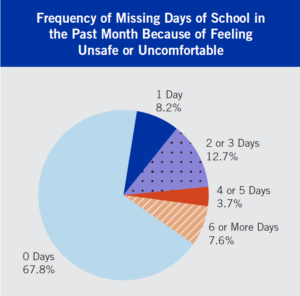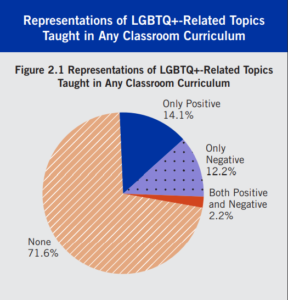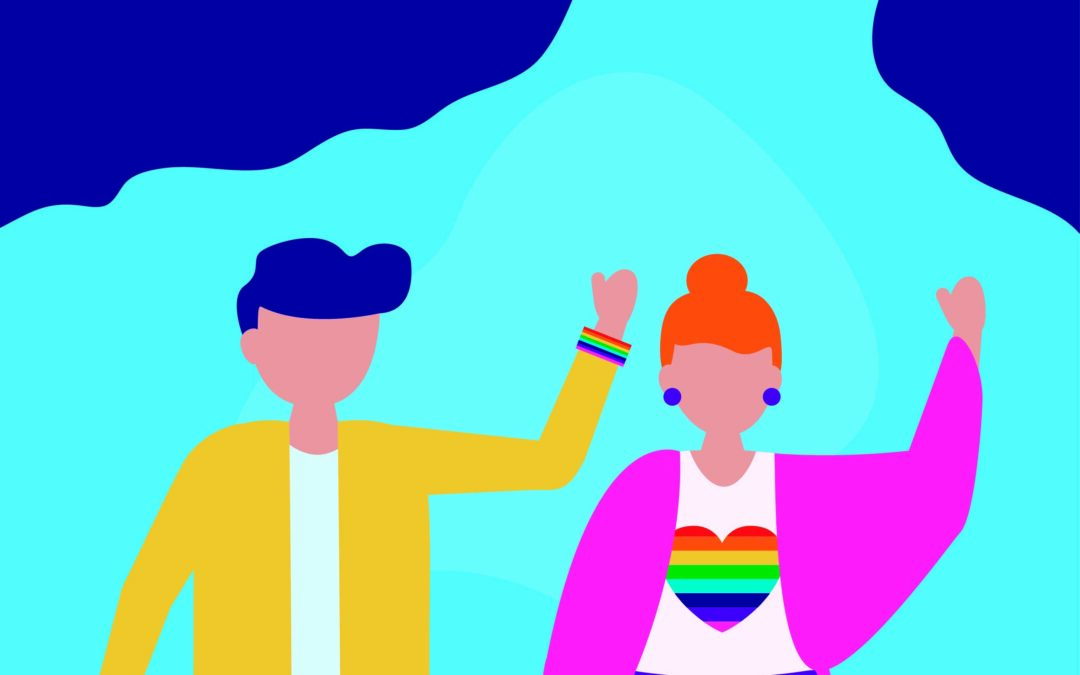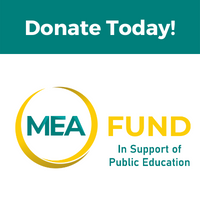Survey highlights issues, offers solutions
Schools nationwide are difficult environments for many LGBTQ+ students, with a survey from the Gay, Lesbian, & Straight Education Network (GLSEN) showing the overwhelming majority regularly hear anti-LGBTQ+ language and experience victimization and discrimination at school. The impact of this environment makes it difficult for these students to receive the education they deserve. The 2021 GLSEN survey is a representative sample of students, ages 13-21 from all 50 states and U.S. territories.
Maine Educator analyzed the survey and pulled some of the data to help members understand how students feel in school, and how to best support them. MEA encourages you to read through the survey to help start or continue the equity conversation at your school.
Understanding How Students Feel in School
SCHOOL SAFETY
- 81.8% of LGBTQ+ students in the survey reported feeling unsafe in school because of at least one of their actual or perceived personal characteristics.
- LGBTQ+ students most avoided school bathrooms, locker rooms, and physical education or gym classes, with approximately 4 in 10 students avoiding each of these spaces because they felt unsafe or uncomfortable.
- 78.8% reported avoiding school functions or extracurricular activities because they felt unsafe or uncomfortable.

HARASSMENT AND ASSAULT AT SCHOOL
The vast majority of LGBTQ+ students who attended school in-person at some point during the 2021-2022 academic year experienced some sort of harassment at school.
- 76.1% experienced in-person verbal harassment
- 31.2% were physically harassed
- 53.7% of LGBTQ+ students were sexually harassed
BUT of those harassed or assaulted…
- 61.5% of LGBTQ+ students did not report the incident to school staff, because they did not think school staff would do anything about the harassment even if they did report it.
AND those who did report an incident….
- 60.3% of the students who did report an incident said that school staff did nothing in response or told the student to ignore it.
DISCRIMINATORY SCHOOL POLICIES AND PRACTICES
Almost 60% of LGBTQ+ students had experienced LGBTQ+-related discriminatory policies or practices at school, including the following:
29.2%
Can’t use chosen pronouns
27.2%
Can’t use bathroom aligned with gender
23.8%
Can’t use locker room aligned with their gender
EFFECTS OF A HOSTILE SCHOOL CLIMATE
A majority (71.6%) of LGBTQ+ students reported that their classes did not include any LGBTQ+ topics in class. Research shows more inclusive curriculum make a difference in how LGBTQ+ students feel at school.
- Were less likely to hear homophobic remarks — “gay” used in a negative way (48.7% compared to 72.0% reporting often or frequently)
- Were less likely to hear negative remarks about transgender people often or frequently (23.6% vs. 42.7%)
- Were more likely to report that their classmates were somewhat or very accepting of LGBTQ+ people (66.9% vs. 35.3%)

SUPPORTIVE EDUCATORS
Students who identified more supportive school staff reported feeling safer at school and were more likely to not miss classes and participate in school activities because they felt more included in the school community. Additionally, a comprehensive anti-bully policy also showed positive results in helping LGBTQ+ students feel safe and supported at school.
- Almost all LGBTQ+ students (96.3%) could identify at least one staff member supportive of LGBTQ+ students at their school.
- More than half of students (58.2%) could identify at least six supportive school staff
SUPPORTIVE SCHOOL POLICIES
Less than a quarter of LGBTQ+ students reported that their school administration was somewhat or very supportive of LGBTQ+ students. That’s why it’s important for schools to adopt policies that focus on the inclusiveness of all students. Among the suggestions, based on the results of the GLSEN survey:
- Providing professional development for school staff to improve rates of intervention and increase the number of supportive teachers and other staff available to students
- Ensuring that school policies and practices, such as those related to dress codes and school dances, do not discriminate against LGBTQ+ students
- Enacting school policies that provide transgender and gender nonconforming students equal access to school activities and specify appropriate educational practices to support these students
- Adopting and implementing comprehensive bullying/harassment policies that specifically enumerate sexual orientation, gender identity, and gender expression in individual schools and districts, with clear and effective systems for reporting and addressing incidents that students experience
Read the full GLSEN Survey here.




